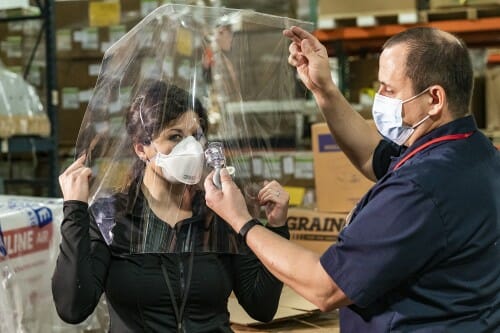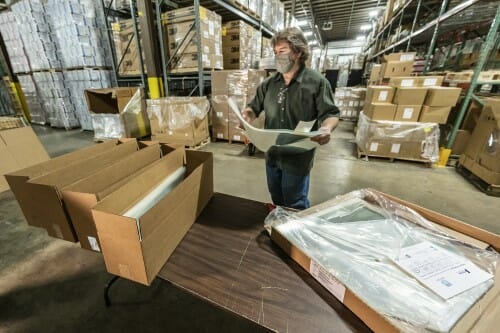WisCon helps small companies via COVID-19 pandemic

Ernie Stracener (right), Head of Industrial Hygiene, and Dan Trocke (left), Safety Advisor for the Wisconsin State Laboratory of Hygiene at the University of Wisconsin-Madison, package PPE supplies in boxes in a warehouse in Madison. Photo: Bryce Richter
The COVID-19 pandemic brought a number of new needs for Wisconsin businesses to learn how to protect their facilities, employees and customers from this new disease.
The Wisconsin State Laboratory of Hygiene launched the WisCon Health and Safety Advisory Program, which has been providing free advisory services and training to companies with fewer than 250 employees for 40 years to help them create safe and healthy workplaces and meet the requirements of the U.S. -American Ministry of Health and Health to meet labor protection agency.
As of July 1, 2020, six of the program’s 16 consultants have spent half of their time counseling and training on COVID-19. This includes virtual reviews of facilities, recommendations on how to control employee exposure, and video training on how to prevent and control COVID-19.
The program created these new services from scratch at the request of the Wisconsin Department of Health. The services are funded by a Federal CARES grant that runs through November 2022.
“We have created a COVID-19 preparedness and response plan template that we make available to companies that need logs,” said Ernie Stracener, WisCon program manager. “We’ll use this template to help them determine what they need and we will give them a lot of guidance.”
WSLH is the state’s public health, environmental, and occupational health laboratory and part of the University of Wisconsin – Madison.

Industrial Hygiene Director Ernie Stracener (right) demonstrates how Danica Harrier, Industrial Hygiene Consultant, both from the Wisconsin State Laboratory of Hygiene, fits on an N95 ventilator. Photo: Bryce Richter
WisCon hosts weekly webinars with live question and answer sessions that are attended by representatives from 10 to 12 companies on a weekly basis.
“It’s nice to have this direct service,” says Stracener. “We are also providing support and OSHA-focused COVID support to the DHS and that has been very useful for them.”
WisCon also offers free COVID-19 respiratory protection program administrator training to support qualified nursing and nursing facilities, of which Wisconsin has 5,000.
“We prepare around 3,000 respiratory mask fit test kits, pack them and send them to facilities that request them from DHS,” says Stracener. “We have created a number of training videos and offer remote advice if necessary.”
Overall, the WisCon program is largely funded by an OSHA grant. It provides support for the small business community in Wisconsin. Almost half of all workers in Wisconsin are employed by companies with fewer than 500 employees.
“The total funding for our program is $ 1.8 million a year. That’s a tremendous return on investment,” says Stracener. “Almost every week we hear from someone who says, ‘How did we not know about you? ‘All of this is financed with taxpayers’ money. “
Free health and safety consultations
In addition to the services WisCon has provided since the beginning of the COVID-19 pandemic, the program provides free and confidential workplace safety and health advisory services to small business owners and senior managers across the state. These services include identifying workplace hazards, performing sampling and assessing employee exposure to occupational hygiene, or helping customers develop and implement a comprehensive safety and health management program.
Stracener hires one of the program’s 16 consultants, including safety specialists and industrial hygienists, to work with the company.
“Looking back at 2019, we conducted 453 on-site consultations for 350 companies in Wisconsin, and that’s pretty typical from year to year,” says Stracener, who views this as a measure of the program’s success. As soon as companies understand the benefits of WisCon consulting, they often return.
“We’re the largest professional health and safety consultancy in the state and it’s free,” he added. “We will do whatever an employer asks us to help them stand on their own two feet to meet OSHA requirements.”
The consultation process starts with a phone call and continues with a site visit (site visits were practically carried out during the pandemic).
“We have focused on delivering virtual consultations, where we provide some of the same benefits of on-site services by working with the customer to conduct hazard assessments in specific areas,” says Stracener. “They take photos and we work them through the photos or take them on a video tour. The consultant offers expert support from outside the company and still helps them to achieve the same goals. “

Dan Trocke, Safety Advisor at the Wisconsin State Laboratory of Hygiene at the University of Wisconsin-Madison, packages PPE supplies in boxes in a warehouse in Madison. Photo: Bryce Richter
As COVID-19 case rates continue to decline across the state, WisCon is working to resume in-person on-site counseling services.
Advisors help employers identify and correct hazards and provide chemical and noise exposure monitoring when necessary.
Customer services are voluntary, free, and confidential, and there are no penalties or enforcement measures. The main obligation of the customer is to correct identified hazards.
WisCon will help provide recommendations on how to resolve these issues, negotiate a correction schedule with the employer, and set a due date for the correction.
“In an imminent dangerous situation, such as someone who is on the top step of a ladder and could fall and be seriously injured, we make sure that the danger is rectified immediately,” explains Stracener. “A serious hazard, like a broken electrical outlet, can directly affect an employee’s health and safety and cause serious harm.”
Companies that work with WisCon to correct hazards cannot be penalized by OSHA for the hazards while it is being corrected. WisCon documents corrected hazards and federal law protects the records of consultation visits from being published.
“We try to have all corrections carried out, documented and completed within 60 days,” says Stracener. “There is a time window in which the employer can make corrections. When something poses a really big threat, e.g. B. spraying combustible paint into a facility, he may need to install a spray booth and correction may take longer. We can help them develop interim safeguards while they correct the hazard. It really is a partnership. “
Recognition for companies with best practices
WisCon also runs the OSHA-sponsored State Safety and Health Achievement Recognition Program, which recognizes companies with excellent health and safety management practices.
“We are working very hard to identify new participants for this program and to increase the number of Wisconsin from eight to 30 or more,” says Stracener. It is inspiring to see new companies join the program and strengthen the work of WisCon.
“When we are challenged with someone who comes to us with a problem and we can help them come to a solution in a relatively short amount of time and see the difference, it is very rewarding,” says Stracener. “I’ve been involved in workplace health and safety for about 30 years and this is by far the most rewarding job I’ve ever had because of the people we meet and serve, and the scope and breadth of what we do . “
